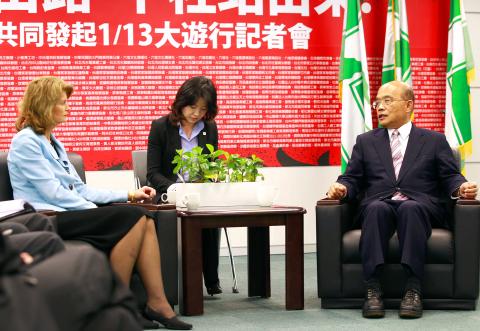While meeting with President Ma Ying-jeou (馬英九) yesterday, US Senator Lisa Murkowski voiced concerns over former president Chen Shui-bian’s (陳水扁) health and the conditions of his imprisonment.
“I have inquired about his [Chen’s] status and his health with President Ma. I think it’s important that, as a former president, he is treated with a level of respect and care,” Murkowski said later yesterday as she took a few questions from local reporters after attending a luncheon hosted by Legislative Speaker Wang Jin-pyng (王金平).
In a separate meeting with Democratic Progressive Party (DPP) Chairman Su Tseng-chang (蘇貞昌), Murkowski was quoted by the director of the DPP’s Policy Research Committee Executive, Joseph Wu (吳釗燮), as telling Su that Ma has said a medical parole for Chen “would not be possible.”

Photo: Li Hsin-fang, Taipei Times, courtesy of the Democratic Progressive Party
However, the senator also told Ma that the international community is closely watching how Taiwan is treating its former president and whether Chen’s case and trial has been handled fairly and transparently, Wu quoted Murkowski as saying.
She reassured Ma that Washington would not interfere with Taiwan’s judicial independence, but would continue monitoring Chen’s case, Wu said.
Chen, serving a 18-and-a-half-year sentence for corruption in Taipei Prison, has been hospitalized since Sept. 21 last year and his family has on several occasions expressed doubt over the hospital’s credibility because it falls under the government’s Veterans Affairs Commission.
Murkowski said she has hoped to visit Chen in person during her stay, but was unable to do so because of limited time.
After arriving in Taiwan at 3am yesterday, Murkowski met with Ma at the Presidential Office later in the morning. She was scheduled to leave at 6am this morning.
Meanwhile, Wu added that Su and Murkowski also exchanged views on Taiwan’s national defense and its role in regional stability during their 60-minute meeting.
“The senator’s meeting with Su primarily focused on two issues: Taiwan’s national defense and regional stability and Taiwan’s democratic development,” Wu said.
Su expressed concern about the Ma administration’s provocative moves in the past year in the East China Sea as the senator from Alaska urged Taiwan to maintain close ties with Japan and the US, Wu said.
Murkowski, who expressed strong support for Taiwan’s procurement of F-16C/D fighter jets during former US president George W. Bush’s administration, also urged Taiwan to allocate sufficient funds for the arms procurement.
Wang and Chinese Nationalist Party (KMT) legislators had pledged to the senator that “the budget issue for F-16C/Ds and F-35s would be appropriately addressed,” Wu quoted Murkowski as saying.
Wu said that Ma has yet to submit Taiwan’s wish list for advanced weapons, such Aegis-equipped destroyers, since he took office in 2008.
The senator and Su also exchanged views on the current status of Taiwan’s democracy.
“Senator Murkowski, who was briefed by her acquaintances in Taiwan yesterday morning, agreed that the judicial and media environment were ‘troubling,’” Wu said.
Murkowski also mentioned the possibility of natural gas trade between Taiwan and Alaska, which was discussed during her trip to Taiwan in 2006, when Su served as premier.
As Taiwan is mulling on an alternative energy to replace nuclear power, natural gas would be an option for generating electricity, Wu quoted Murkowski as saying.

Taipei has once again made it to the top 100 in Oxford Economics’ Global Cities Index 2025 report, moving up five places from last year to 60. The annual index, which was published last month, evaluated 1,000 of the most populated metropolises based on five indices — economics, human capital, quality of life, environment and governance. New York maintained its top spot this year, placing first in the economics index thanks to the strength of its vibrant financial industry and economic stability. Taipei ranked 263rd in economics, 44th in human capital, 15th in quality of life, 284th for environment and 75th in governance,

Greenpeace yesterday said that it is to appeal a decision last month by the Taipei High Administrative Court to dismiss its 2021 lawsuit against the Ministry of Economic Affairs over “loose” regulations governing major corporate electricity consumers. The climate-related lawsuit — the first of its kind in Taiwan — sought to require the government to enforce higher green energy thresholds on major corporations to reduce emissions in light of climate change and an uptick in extreme weather. The suit, filed by Greenpeace East Asia, the Environmental Jurists Association and four individual plaintiffs, was dismissed on May 8 following four years of litigation. The

A former officer in China’s People’s Liberation Army (PLA) who witnessed the aftermath of the 1989 Tiananmen Square massacre has warned that Taiwan could face a similar fate if China attempts to unify the country by force. Li Xiaoming (李曉明), who was deployed to Beijing as a junior officer during the crackdown, said Taiwanese people should study the massacre carefully, because it offers a glimpse of what Beijing is willing to do to suppress dissent. “What happened in Tiananmen Square could happen in Taiwan too,” Li told CNA in a May 22 interview, ahead of the massacre’s 36th anniversary. “If Taiwanese students or

The New Taipei City Government would assist relatives of those killed or injured in last month’s car-ramming incident in Sansia District (三峽) to secure compensation, Mayor Hou You-yi (侯友宜) said yesterday, two days after the driver died in a hospital. “The city government will do its best to help the relatives of the car crash incident seek compensation,” Hou said. The mayor also said that the city’s Legal Affairs, Education and Social Welfare departments have established a joint mechanism to “provide coordinated assistance” to victims and their families. Three people were killed and 12 injured when a car plowed into schoolchildren and their